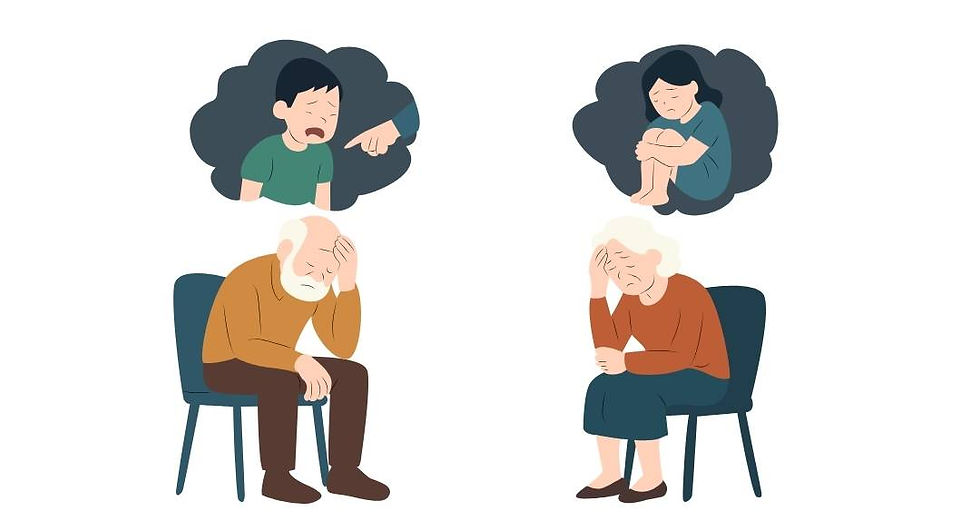How Integrating Parts-work therapy and EMDR therapy leads to healing in Westchester, NY
- annabellalipson
- Oct 17, 2023
- 4 min read

EMDR has evolved over the years, incorporating innovative techniques that enhance its therapeutic potential. One such advancement is the integration of parts work interventions, which delve into the intricate layers of our inner selves.
In this blog article, we will explore the concept of parts work within the framework of EMDR, uncovering how this combination can lead to profound healing and self-discovery.
What does "Parts-work" mean?
Theoretical Frameworks that use the language of parts Ego-states Theory:
Ego-states theory posits that our psyche contains different ego-states, each developed to cope with specific life situations or traumas. For instance, an individual may have a child ego-state that carries the memories and emotions of their childhood experiences, a critical parent ego-state that judges and criticizes, and an adult ego-state that handles daily responsibilities.
Internal Family Systems:
Internal Family Systems (IFS) therapy is a unique approach that views the human psyche as a complex system of different subpersonalities or "parts." These parts can be thought of as distinct aspects of one's personality, each with its own beliefs, emotions, and protective mechanisms. The goal of IFS therapy is to help clients identify and communicate with these parts, fostering self-awareness and inner harmony.
Key principles of IFS therapy include: The Self: At the core of IFS therapy is the concept of the "Self," which represents the client's true, unburdened, and inherently compassionate nature. The therapist helps the client connect with their Self to facilitate healing and self-discovery. Parts: Clients are encouraged to identify and understand various parts of themselves, including wounded parts (carrying past traumas) and protective parts (aimed at shielding from emotional pain). Internal Dialogue: Through guided internal dialogues, clients learn to communicate with and heal wounded parts, ultimately reintegrating them into a healthier and more balanced whole.
Common themes that each theory shares
-Parts work interventions are rooted in the idea that our personalities are composed of various sub-personalities or "parts." These parts are distinct aspects of ourselves that hold unique beliefs, emotions, and memories.
-Parts work interventions aim to identify, understand, and harmonize these parts within us. This process can help individuals gain insight into their internal conflicts, unresolved trauma, and self-sabotaging behaviors. Integrating parts work with EMDR offers a unique opportunity to work directly with these parts of self, facilitating deep healing and transformation.
Phases 1 & 2 of EMDR Therapy
Phase 1: History Taking: -Parts work helps clients understand the origin of their trauma and how it has shaped their inner world. -Ego-states (or parts) may hold unique traumatic memories that contribute to an individual's emotional distress and dysfunctional behaviors. Integrating EMDR with parts work helps therapists and their clients target and process these ego-state-specific traumas. -Using a parts-work approach during the history taking phase of EMDR can help uncover hidden traumas and conflicts, allowing for deeper processing and resolution. By reprocessing these memories, clients can experience profound relief and transformation.
Phase 2: Preparation/Resourcing -Parts work interventions are seamlessly woven into the resourcing phase of EMDR therapy. This phase aims to prepare the client for trauma processing by establishing a sense of safety and empowerment. -Therapists can use various techniques to help clients access the different parts of self, which can serve as a resourceful and stabilizing presence during EMDR sessions. -Clients learn to identify and activate their adult-parts or nurturing-parts when they feel overwhelmed or triggered, fostering a sense of self-regulation. -During EMDR processing, clients may encounter distressing memories or emotions associated with particular ego-states or parts. EMDR therapists can guide clients in safely bridging to these unresolved parts, facilitating communication and understanding between the different aspects of the self.
Why Parts work and EMDR therapy compliment each other so well:
Enhanced Self-Awareness -Parts-work enhances self-awareness by illuminating the various parts that make up an individual's personality. This heightened awareness can empower clients to make conscious choices and change maladaptive patterns.
Working with Resistance (or Looping) -Identifying and communicating with protective parts can create a safe internal environment for processing traumatic memories -Therapists address any resistance or looping during the reprocessing phases by understanding the concerns of these protective parts and facilitating their cooperation in the healing process.
Integration of Healing -Combining EMDR with ego-states or IFS offers a more holistic approach to therapy, addressing the multifaceted nature of human experience. Clients can achieve a deeper understanding of their inner dynamics and heal on multiple levels—emotionally, cognitively, and behaviorally.
Increased Resilience -EMDR's resourcing phase and parts-work integration provide clients with valuable tools to manage distress and triggers effectively. This increased resilience can be instrumental in dealing with current and future life's challenges.
Through the exploration of the integration of parts work within the framework of EMDR, it becomes evident that this synergy holds the potential for transformative healing and self-discovery.
As EMDR continues to evolve and embrace innovative techniques, the incorporation of parts work interventions provides a nuanced approach to addressing the complexities of the human psyche. By delving into the intricate layers of our inner selves, this combined therapeutic approach opens doors to profound insights and breakthroughs, offering a holistic path toward lasting emotional well-being.
Annabella Lipson is a Licensed Mental Health Counselor at Peaceful Living Mental Health Counseling in Scarsdale, NY.
She enjoys working with young adults & adults who are dealing with grief, constant sadness, anxiety, PTSD and other heavy emotions that make it difficult to enjoy the present moment.
Annabella has some availability to take new clients Monday through Thursday, virtually and in person.





Comments